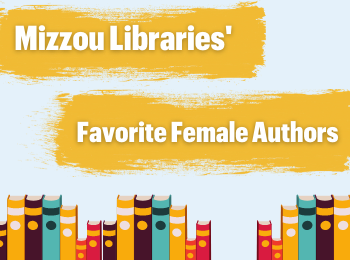National Women’s Month may be coming to an end, but there are still many ways you can support female voices throughout the rest of this month and beyond! Whether you chose to donate to a nonprofit organization or decide to learn more about women’s history through sites such as https://womenshistorymonth.gov/, here at Mizzou Libraries, we encourage you to continue showcasing and uplifting women’s voices however you can. One of our favorite ways to celebrate anything at our libraries is by supporting our favorite books and authors! To celebrate National Women’s Month, we asked some library staff members who their favorite female authors are!
Rachel Brekhus (Librarian III, Humanities/Social Sciences Librarian, Instruction Department): Octavia Butler, Sheri S. Tepper, and Harriet Washington.
William Morgan (Library Information Specialist, E-Learning): Marilynne Robinson and Jesmyn Ward.
Gwen Gray (Librarian III, Business, Economics, & Entrepreneurship): Donna Leon, Agatha Christie, Carol Carnac, Sujata Massey, Anne Perry, and Charles Todd.
Corrie Hutchinson (Associate University Librarian for Acquisitions, Collections, and Technical Services): Jane Austen and Agatha Christie.
Rebecca Graves (Educational Services Librarian, Health Sciences Library): Ursula Le Guin and N. K. Jemisin.
Erin Merrill (Library Info Specialist): Sophie Kinsella and Gail Carriger.
Dorothy Carner (Head, Journalism Libraries): Deborah Willis (here is an online exhibit curated by Journalism Libraries showcasing Willis’ work https://spark.adobe.com/page/ZYMtHBO9rPcTn/ )
You can check out many of these authors at your Mizzou Libraries: http://merlin.lib.umsystem.edu/search/X.
Along with reading from your favorite authors, it is also important to remember why supporting female voices is essential when consuming literature. Here is why Mizzou Libraries’ staff members believe reading work by women is important to them!
Corrie Hutchinson: I think it’s important to read female authors so that you have a balanced viewpoint. Books and stories are how people share viewpoints and experiences, so why limit yourself to only one perspective? Why escape to a world that only men created? That’s just silly. No limits.
William Morgan: Because male authors were so much of my own education as well as what I had to teach in World Literature as a high school teacher, I feel I need to focus more on female authors so that I have a more well-rounded view of both historical and modern literature.
Rebecca Graves: Their writing is rich and deep. It is not so filtered through the lens of “I” of being the focus of attention when walking into a room. There’s more depth to even the minor characters. I.e., the characters are there for the story and have their own backstory. They aren’t just there to prop up the lead. I find more variety in their writing. True, all genders of writers have tackled the hero’s journey, but there are more stories to be told than simply the hero’s. I also find it confirming that women have written brilliant stories. To read Le Guin or Jemisin is to have excellent language, rich worlds, and well-crafted plots. They are masters of the craft.
Whatever way you decide to celebrate the duration of Women’s History Month, we hope you visit one of our Mizzou Libraries and pick up a book to support female authors!
Danielle Gorman / English Intern/ Spring 2021
